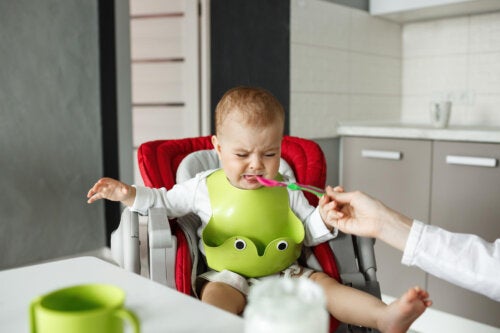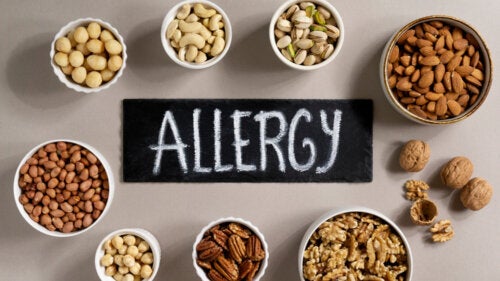9 Foods to You Shouldn’t Give Your 6-Month-Old Baby
There are some foods you shouldn't give your 6-month-old baby. For example, honey and coffee can put your child's overall health at risk.

When it comes to feeding your 6-month-old baby, it’s essential to know which foods to avoid to ensure their health and well-being. At this stage of introduction to complementary feeding, there are certain foods you shouldn’t give your 6-month-old due to possible risks or adverse reactions. In this article, we’ll tell you about some of the foods you should avoid and why.
Foods you shouldn’t give to 6-month-old babies
Choking on foods, allergies, and kidney overload are some of the risks when we introduce new foods into the diet of a 6-month-old baby. So here is a list of foods to avoid.
Remember that the foods you introduce to your little one’s diet and the way in which you do so should be guided by health professionals. Therefore, be sure to consult your pediatrician.
1. Cow’s milk

Although milk is a recommended food for many children in the world, it shouldn’t be introduced in the diet of babies until after 12 months of age. Before the age of one year, breast milk is recommended, and if this isn’t possible, it should be replaced by milk formulas adapted to each condition and age.
Why shouldn’t you give this food to your 6-month-old? According to the Centers for Disease Control and Prevention (CDC), cow’s milk contains high values of proteins and minerals that the child’s kidneys can’t process and can cause intestinal bleeding. It also lacks some necessary nutrients that breast milk does provide.
2. Round or hard foods
Round-shaped foods or foods that are hard can pose a choking risk for babies who are still learning to chew and swallow.
In 2021, the International Journal of Pediatrics Otorhinolaryngology exposed that choking remained a highly prevalent cause of death in children between 0 and 4 years of age.
With this in mind, some of the foods that you shouldn’t give to your 6-month-old baby include the following:
- whole grapes
- carrots
- raw apples
- nuts
- popcorn
To prevent accidents, these foods should be cut into very small pieces, the skin and seeds should be removed, and they should be mashed very well or cooked as purees. As for popcorn, you should wait until after two years of age before giving it to your child.
3. Honey

Honey is a natural sweetener that can be used to sweeten baby food. However, it’s a food you shouldn’t give your child until they reach the age of one year. Ghaida Batarseh of Michigan State University says that bee honey accounts for 68% of reported cases of botulism, the leading cause in the United States.
This disease is caused by the accidental contamination of honey with spores of a bacterium called Clostridium botulinum, which releases a poisonous toxin that affects the nervous system. Before the age of one year, babies don’t have a strong enough immune system to fight this bacteria.
4. Leafy greens and other vegetables
The journal Pediatrics Research points out that babies can’t metabolize substances called nitrites, which, in high concentrations, oxidize the hemoglobin that transports oxygen to the body. This is due to the immaturity of its digestive system and the absence of certain enzymes.
This is one of the reasons why methemoglobinemia, or “blue baby syndrome,” occurs, a condition in which almost no oxygen reaches the body’s cells. According to the Spanish Agency for Food Safety and Nutrition, the main sources of nitrites are:
- chard
- beets
- lettuce
- celery
- spinach
- pumpkin
- turnip
- and, at lower levels, zucchini, leeks, green beans, carrots, among others
Therefore, this agency recommends not including spinach and chard before the age of one year. If, for some reason, it’s necessary to include them, then you should make sure not to exceed 20 grams per 100 grams of puree. If your baby suffers from gastrointestinal infections, then they should be excluded completely.
Read also: Why Does a Baby’s Skin Tone Change?
5. Fish that’s high in mercury
Some types of fish, such as swordfish, yellowfin tuna, and shark, can contain very high levels of mercury. This is a contaminant that, according to the American Academy of Pediatrics, can have harmful effects on a child’s developing nervous system.
According to this organization, tilefish, orange roughy, marlin, bigeye tuna, and bluefin tuna are also among the foods you shouldn’t give to growing children. The rest of the fish, such as salmon, trout, or tuna, can be included in the diet after six months of age.
6. Caffeinated food products

Caffeine is present in foods and beverages such as coffee, tea, chocolate, candy, chewing gum, mint, and some drinks such as energy drinks and carbonated beverages.
A group of researchers published in the journal Frontiers in Psychiatry that caffeine is a central nervous system stimulant and can interfere with a baby’s sleep patterns and cause irritability.
According to the group of experts, infants are vulnerable to caffeine, so it should be controlled during breastfeeding, as it can pass through breast milk.
Furthermore, health agencies state that so far, there’s no established “safe dose” of caffeine in children under 12 years of age. However, the European Food Safety Agency considers that 3 milligrams per kilogram of weight per day could be safe.
At the same time, the Johns Hopkins Hospital recognizes that, although there are no federal guidelines, they recommend waiting until four years of age to include caffeinated foods and beverages in a child’s diet.
7. Processed foods
Processed foods such as salami, bologna, ham, pastries, snack foods, breakfast cereals, seasonings, and instant soups, among others, contain high levels of salt, sugar, and additives that are harmful to your baby. Therefore, they’re on the list of foods you shouldn’t give your 6-month-old.
The American Journal of Clinical Nutrition also points out that processed foods lack vital nutrients that are necessary for the good growth and development of your baby.
8. Salt and sugar
The World Health Organization (WHO) suggests the reduction of salt consumption in the population, especially in children. It recommends not using it at all in baby food until after two years of age. But what’s the main reason? Well, their kidneys aren’t prepared for the amount of sodium that salt provides.
In addition, babies should be allowed to taste the original flavors of each food, without salt, so that they begin to establish their tastes and preferences.
As for sugar consumption, the WHO states that consumption should be restricted to less than 10 percent of total caloric intake, and suggests that it be reduced even further, i.e., to 5 percent of the total calories in a child’s diet. Possible excess weight or obesity and an increased risk of tooth decay justify this restriction in children.
It’s not only refined or brown sugar that you shouldn’t give your baby, but also foods with added sugars, such as ice cream, cookies, pastries, soft drinks, commercial juices, energy drinks, and sports drinks, among others.
The European Society of Pediatric Gastroenterology, Hepatology, and Nutrition recommends excluding sugar in the diet of infants up to 2 years of age. From then on, it recomends using only four teaspoons a day.
9. Allergenic foods

Although not completely discouraged at six months of age, highly allergenic foods such as peanuts, tree nuts, eggs, cow’s milk, wheat, fish, shellfish, sesame, and soy should be introduced with caution in the infant’s diet.
The organization Only About Children recommends introducing them one at a time, with a lapse of several days between them, and offering them foods that your baby is already familiar with. Also, these foods should only be introduced under close supervision. This way, you have time to observe possible signs of allergic reaction such as vomiting, rashes, diarrhea, or difficulty breathing.
The goal is to establish a healthy diet adapted to their stage of growth
It’s important to be aware of the safety of your baby’s diet for healthy growth. For this, simple condiments such as salt, sugar in all its presentations, processed foods, coffee, tea, chocolate, and its derivatives should be excluded.
As for minimally processed foods, cow’s milk, honey, green leaves, and other vegetables such as beets, turnip, leeks, pumpkin, among others, shouldn’t be included in your infant’s diet. At the same time, foods with a certain shape and texture, such as grapes, carrots, and raw apples, should also be excluded from the diet due to the risk of choking.
It’s necessary to ensure a balanced and varied diet that’s sufficient in regard to quality and quantity. In addition, it’s the right time to instill good eating habits, starting with a healthy family diet.

